Nemesis - Harry Hole 02 Read online
Page 16
'Trond Grette?' Harry asked.
He didn't recognise the person who turned round. Grette had cut off all his hair, his face was leaner and the wild expression in his eyes from the evening on the tennis court was replaced by a calm, vacant thousand-metre stare which went right through them. Harry had seen it before. They looked like that after the first weeks behind bars when they started doing their penance. Harry knew instinctively this man was doing the same. He was doing penance.
'We're police,' Harry said.
Grette shifted his stare towards them.
'It's about the bank raid and your wife.'
Grette half-closed his eyes, as if he had to concentrate to understand what Harry was saying.
'We were wondering if we could ask you some questions,' Beate said in a loud voice.
Grette nodded slowly. Beate pulled a chair closer and sat down.
'Can you tell us about her?' she asked.
'Tell you?' His voice creaked like a badly oiled door.
'Yes,' Beate said with a gentle smile. 'We would like to know who Stine was. What she did. What she liked. What plans you had. That sort of thing.'
'That sort of thing?' Grette looked at Beate. Then he put down the pen. 'We were going to have children. That was the plan. Test-tube babies. She hoped for twins. Two plus two, she always said. Two plus two. We were just about to start. Right now.' Tears welled in his eyes.
'You'd been married for a long time, hadn't you?'
'Ten years,' Grette said. 'If they hadn't played tennis, I wouldn't have minded. You can't force children to like the same things as parents, can you. Perhaps they would have preferred horse riding. Horse riding is wonderful.'
'What sort of person was she?'
'Ten years,' Grette repeated, facing the window again. 'We met in 1988. I had started at Management School in Oslo and she was in her last year at Nissen High School. She was the best-looking girl I'd ever seen. I know everyone says the good-looking one is the one you never got and have perhaps forgotten, but with Stine it was true. And I never stopped thinking she was the best-looking. We moved in together after a month and were together for every single day and night for three years. Yet I still couldn't believe that she had said yes to becoming Stine Grette. Isn't it strange? When you love someone enough, you find it incomprehensible that they can love you. It should be the opposite, shouldn't it?'
A tear fell on the arm of the chair.
'She was kind. There are not so many people who value that quality any more. She was reliable, loyal and always gentle. And brave. If she thought she heard noises downstairs and I was asleep, she got up herself and went down. I said she should wake me because what if one day burglars really were downstairs? But she just laughed and said: Then I'll offer them waffles and the waffle smell will wake you up, because it always does. The smell of waffles was supposed to wake me up when . . . yes.'
He snorted air through his nose. The bare branches of the birch trees outside waved to them in the gusting wind. 'You should have made waffles,' he whispered. Then he tried to laugh, but it sounded like crying.
'What were her friends like?' Beate asked.
Grette hadn't finished laughing and she had to repeat the question.
'She liked being on her own,' he said. 'Perhaps because she was an only child. She had a lot of contact with her parents. And then we had each other. We didn't need anyone else.'
'She could have had contact with others you didn't know about, couldn't she?' Beate said.
Grette looked at her. 'What do you mean?'
Beate's cheeks went a flustered red and she gave a quick smile. 'I mean that your wife may not necessarily have passed on the conversations she had with all the people she met.'
'Why not? What are you trying to say?'
Beate swallowed and exchanged glances with Harry. He took over. 'In our investigations we always have to examine all the possibilities, however unlikely they may seem. And one of them is that some of the bank employees may be in league with the robber. Sometimes there is inside help with both the planning and the execution of the job. There is little doubt, for example, that the robber knew when the ATM would be refilled.' Harry studied Grette's face for signs of how he took that. But his eyes told him that he had left them again. 'We've been through the same questions with all the other employees,' he lied.
A magpie shrieked from the tree outside. Plaintive, lonely. Grette nodded. At first slowly, then faster.
'Aha,' he said. 'I understand. You think that's why Stine was shot. You think she knew the robber. And when he had finished using her, he shot her to remove any possible leads. Isn't that right?'
'Well, at least it's a theoretical possibility,' Harry said.
Grette shook his head and laughed again: sad, hollow laughter. 'It's clear you didn't know my Stine. She could never do anything like that. And why should she? If she'd lived a little longer, she would have been a millionaire.'
'Oh?'
'Walle Bodtker, her grandfather. Eighty-five years old and owner of three blocks of flats in the city centre. He was diagnosed with lung cancer this summer and since then there has been only one way it was going to go. His grandchildren would have received a block each.'
Harry's question was purely a reflex action: 'Who will get Stine's block now?'
'The other grandchildren,' Grette answered with revulsion in his voice. 'And now you're going to check their alibis, aren't you?' 'Do you think we should?' Harry asked.
Grette was about to answer, but paused when his eyes met Harry's. He bit his lower lip.
'I apologise,' he said, running a hand across his unshaven face. 'Of course I ought to be glad that you're examining every possibility. It all just seems so hopeless. And meaningless. Even if you catch him, I'll never get back what he's taken from me. Not even the death penalty would do that. Losing your life is not the worst thing that can happen.' Harry already knew how he would continue. 'The worst thing is to lose your reason for living.'
'Yes,' Harry said, standing up. 'This is my card. Ring me if anything occurs to you. You can also ask to speak to Beate Lonn.'
Grette had turned to face the window again and didn't see Harry holding out his card, so he left it on the table. Outside, it was becoming darker and they were seeing semi-transparent reflections in the window, like ghosts.
'I have a feeling I've seen him,' Grette said. 'On Fridays I usually go straight from work to play squash at the Focus centre in Sporveisgata. I didn't have a partner and so I went into the fitness room instead. Lifted weights, cycled, that sort of thing. There are so many people at that time you often have to queue.'
'That's right,' Harry said.
'When Stine was killed, I was in there. Three hundred metres down from the bank. Looking forward to a shower and going home and starting to cook. I always cooked the meal on Fridays. I liked waiting for her. Liked . . . waiting. Not all men do.'
'What do you mean you saw him?' Beate asked.
'I saw someone walk past me into the changing room. He was wearing baggy, black clothes. Like overalls.'
'Balaclava?'
Grette shook his head.
'Cap with a peak maybe?' Harry asked.
'He was holding some headgear in his hand. It might have been a balaclava. Or a peaked cap.'
'Did you see his fa—?' Harry began, but was interrupted by Beate.
'Height?'
'Don't know,' Grette said. 'Average height. What's average though? 1.80?'
'Why didn't you tell us this before?' Harry asked.
'Because,' Grette said, pressing his fingers against the glass, 'it's just a feeling. I know it wasn't him.'
'How can you be so sure?' Harry asked.
'Because two of your colleagues were here a few days ago. They were both called Li.' He swivelled round and looked at Harry. 'Are they related?'
'No. What did they want?'
Grette took his hand away. The window had misted up around the greasy marks.
'They wanted
to check if Stine might have been involved in some way with the bank robber. And they showed me photos of the robbery.'
'And?'
'The overalls were black without any markings. Those I saw at the Focus centre had large white letters on the back.' 'What letters?' Beate asked.
'P-o-l-i-t-i,' Grette said, rubbing the greasy marks off. 'When I was in the street afterwards, I could hear police sirens in Majorstuen. The first thing I thought was how strange it was that thieves could escape with such a large police presence.'
'Yes, indeed. What made you think that?'
'I don't know. Perhaps because someone had just stolen my squash racquet from the changing room while I was training. My next thought was that Stine's bank was being robbed. That's how your mind works when your imagination runs wild, isn't it. Then I went home and made lasagne. Stine loved lasagne.' Grette made an attempt at a smile. Then the tears began to flow.
Harry fixed his eyes on the piece of paper Grette had written on so as not to see the grown man crying.
'I saw from your six-monthly bank statement there had been a large withdrawal.' Beate's voice sounded harsh and metallic. 'Thirty thousand kroner in Sao Paulo. What did you spend it on?'
Harry looked up at her in surprise. She seemed quite untouched by the situation.
Grette smiled through his tears. 'Stine and I celebrated our tenth wedding anniversary there. She had some holiday due and went a week before me. That was the longest we had ever been apart.'
'I asked you what you spent the thirty thousand in Brazilian currency on,' Beate said.
Grette turned to the window. 'That's a private matter.'
'And this is a murder case, herr Grette.'
Grette fixed her with a long, hard look. 'You've obviously never been in love with anyone, have you.'
Beate's brow darkened.
'The German jewellers in Sao Paulo are reckoned to be among the best in the world,' Grette said. 'I bought the diamond ring Stine was wearing when she died.'
Two carers came for Grette. Lunch. Harry and Beate stood by the window watching him while they waited for the carer to show them the way out.
'I'm sorry,' Beate said. 'I made a fool of myself. I . . .' 'It was fine,' Harry said.
'We always check the finances of suspects in bank cases, but I probably went too far this time . . .'
'I said it was fine, Beate. Never apologise for the questions you asked; apologise for the ones you didn't ask.'
The carer arrived and unlocked the door.
'How long will he be here?' Harry asked.
'He's being sent home on Wednesday,' the carer said.
In the car on the way to the city centre Harry asked Beate why carers always 'send patients home'. After all, they didn't provide the transport, did they. And the patients decided themselves if they wanted to go home, or anywhere else, didn't they. So why couldn't they say 'were going home'? Or 'were being discharged'?
Beate didn't have a view on this, and Harry focused on the grey weather, thinking he had begun to sound like a grumpy old man. Before, he had only been grumpy.
'He's changed his hair,' Beate said. 'And he's wearing glasses.'
'Who's that?'
'The carer.'
'Oh, I didn't know you knew each other.'
'We don't. I saw him on the beach in Huk once. And in Eldorado. And in Stortingsgata. I think it was Stortingsgata . . . must be five years ago.'
Harry studied her. 'I didn't realise he was your type.'
'It's not that,' she said.
'Ah,' Harry said. 'I forgot. It's that brain defect of yours.' She smiled. 'Oslo's a small town.'
'Oh yes? How many times had you seen me before you came to Police HQ?'
'Once. Five years ago.' 'Where was that?'
'On TV. You had solved that case in Sydney.' 'Mm. I guess that must have made an impression.' 'I only remember it irritated me that you came over as a hero even though you had failed.'
'Oh.'
'You never brought the murderer to court, you shot him dead.'
Harry closed his eyes and thought about how good the first drag of his next cigarette would be. He patted his chest to feel if the packet was in his inside pocket and pulled out the folded piece of paper to show to Beate.
'What's that?' Beate asked.
'The page Grette was scribbling on.'
'A Wonderful Day,' she read.
'He's written it thirteen times. A bit like The Shining, isn't it.' 'The Shining?.'
'You know, the horror film. Stanley Kubrick.' He shot her a glance from the corner of his eye. 'The one where Jack Nicholson is sitting in a hotel writing the same sentence again and again.'
'I don't like horror films,' she said quietly.
Harry faced her. He was on the point of saying something, but then felt it was best to leave it.
'Where do you live?' she asked.
'Bislett.'
'It's on the way.'
'Hm. What to?' 'Oppsal.'
'Yes? Where in Oppsal?'
'Vetlandsveien. Right by the station. Do you know where Jornslokkveien is?'
'Yes, there's a big yellow timber house on the corner.'
'Exactly. That's where I live. On the first floor. My mother lives on the ground floor. I grew up in that house.'
'I grew up in Oppsal, too,' Harry said. 'Perhaps we know the same people?'
'Perhaps,' Beate said, looking out through the window. 'Have to check that out some time,' Harry said. Neither of them said another word.
The evening came and the wind picked up. The weather report forecast storms south of Stadt and squalls in the north. Harry coughed. He took out the sweater his mother had knitted for his father and which he had given Harry as a Christmas present some years after her death. A strange thing to do, Harry mused. He heated the pasta and meatballs, and then rang Rakel and told her about the house where he had grown up.
She didn't say much, but he could tell she liked hearing him talk about his bedroom. About his games and the little dressing table. About how he had made up stories from the wallpaper pattern, as if they were fairy tales written in code. And one drawer in the dressing table which his mother and he had agreed was only his, and she would never touch.
'I kept my football cards there,' said Harry. 'Tom Lund's autograph. A letter from Solvi, a girl I met one summer holiday in Andalsnes. Later, my first packet of cigarettes. A packet of condoms. They lay there unopened until they had passed the sell-by date. Then, when my sister and I blew them up, they were so dry they split.'
Rakel laughed. Harry carried on, just to hear her laughing.
After the call he paced up and down restlessly. The news was a reprise of the day before. Squalls building up over Jalalabad.
He went into his bedroom and switched on the computer. As it creaked and hummed he saw that he had received another e-mail. He felt his pulse race when he saw the address. He clicked.
Hi Harry
The game has begun. The post-mortem established you could have been present when she died. Is that why you're keeping it to yourself? Probably very wise. Even if it looks like suicide. There are a couple of things that don't tally, though, aren't there? Your move.
S2MN
A bang made Harry jump and he realised he had smacked his palm down on the table with all his strength. He looked around the dark room. He was angry and frightened, but the frustrating thing was his instinct that the e-mail writer was so . . . close at hand. Harry stretched out his arm and placed his still-smarting hand against the screen. The cold glass cooled his skin, but he could feel heat, a kind of body heat, building up inside the machine.
19
The Shoes on the Wire
Elmer scampered down Gr0nlandsleiret with a quick greeting and smile to customers and employees in neighbouring shops. He was annoyed with himself. Once again he had run out of change and been obliged to hang up a back soon sign on the door while he nipped into the bank.
He pulled open the door, strode into the b
ank, sang out his usual 'Good morning' and hurried over to take a ticket. No one answered, but he was used to that by now - only white Norwegians worked here. There was a man who seemed to be repairing the ATM and the only customers he could see were standing by the window overlooking the street. It was unusually quiet. Was something going on he hadn't quite caught wind of?
'Twenty,' a woman's voice called out. Elmer looked at the number on his ticket. It said 51, but since all the positions were closed, he went to the till where the woman's voice came from.

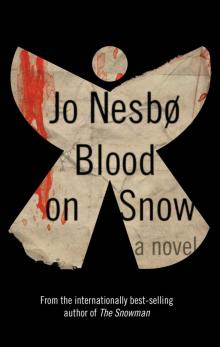 Blood on Snow: A novel
Blood on Snow: A novel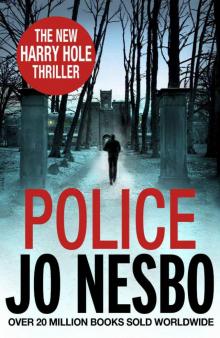 Police: A Harry Hole thriller (Oslo Sequence 8)
Police: A Harry Hole thriller (Oslo Sequence 8) Doctor Proctor's Fart Powder: The Great Gold Robbery
Doctor Proctor's Fart Powder: The Great Gold Robbery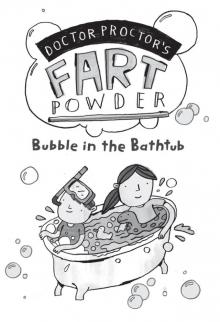 Bubble in the Bathtub
Bubble in the Bathtub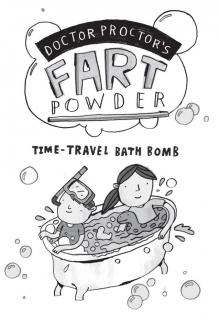 Doctor Proctor's Fart Powder: Time-Travel Bath Bomb
Doctor Proctor's Fart Powder: Time-Travel Bath Bomb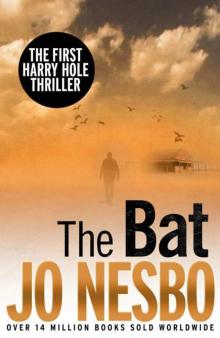 The Bat
The Bat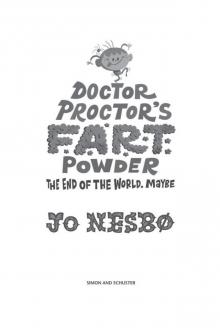 Doctor Proctor's Fart Powder: The End of the World. Maybe.
Doctor Proctor's Fart Powder: The End of the World. Maybe.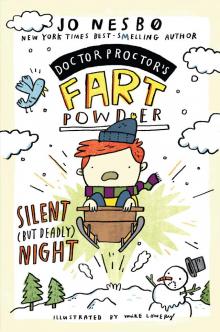 Silent (but Deadly) Night
Silent (but Deadly) Night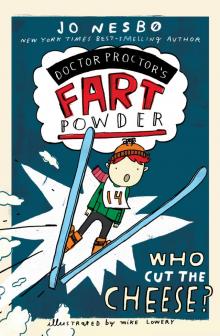 Who Cut the Cheese?
Who Cut the Cheese? Headhunters
Headhunters The Jealousy Man and Other Stories
The Jealousy Man and Other Stories Harry Hole Mysteries 3-Book Bundle
Harry Hole Mysteries 3-Book Bundle The Thirst
The Thirst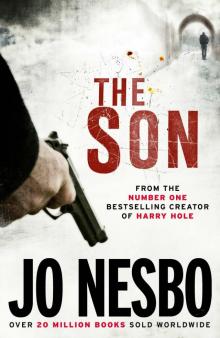 The Son
The Son The Redeemer
The Redeemer The Kingdom
The Kingdom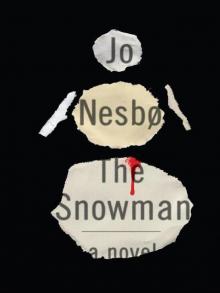 The Snowman
The Snowman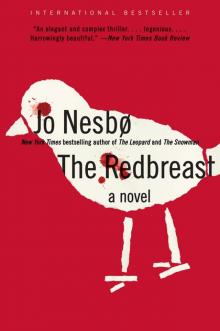 The Redbreast
The Redbreast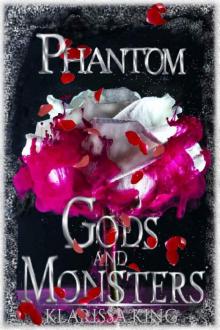 Phantom
Phantom Macbeth
Macbeth The Leopard
The Leopard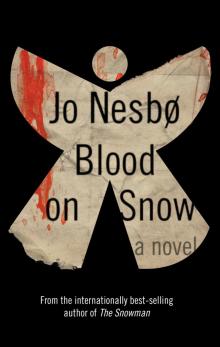 Blood on Snow
Blood on Snow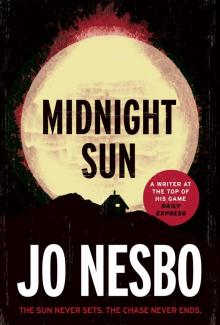 Midnight Sun
Midnight Sun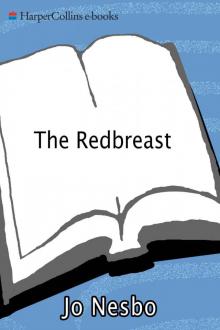 The Redbreast (Harry Hole)
The Redbreast (Harry Hole)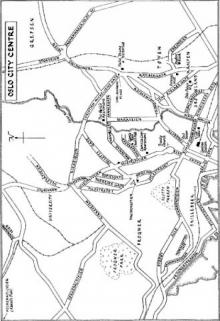 The Devil's Star
The Devil's Star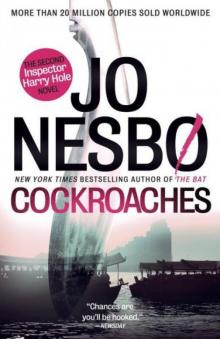 Cockroaches
Cockroaches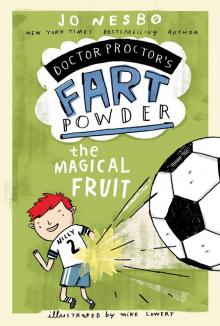 The Magical Fruit
The Magical Fruit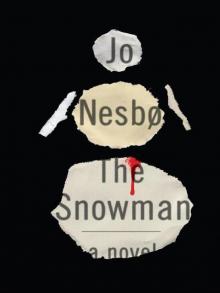 The Snowman: A Harry Hole Novel
The Snowman: A Harry Hole Novel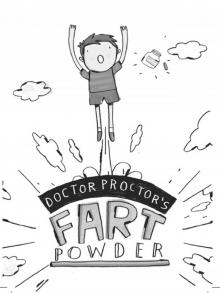 Doctor Proctor's Fart Powder
Doctor Proctor's Fart Powder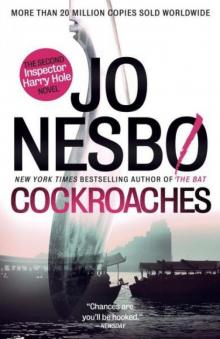 The Cockroaches
The Cockroaches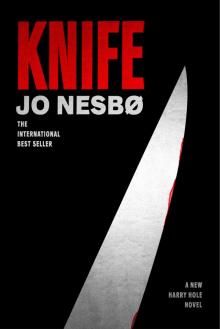 Knife
Knife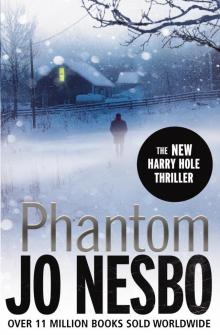 Phantom hh-9
Phantom hh-9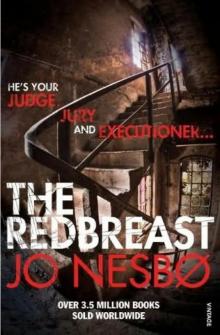 The Redbreast hh-3
The Redbreast hh-3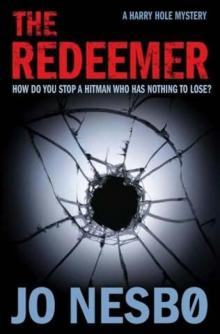 The Redeemer hh-6
The Redeemer hh-6 The Leopard hh-8
The Leopard hh-8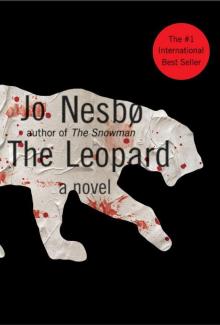 The Leopard: An Inspector Harry Hole Novel
The Leopard: An Inspector Harry Hole Novel The Great Gold Robbery
The Great Gold Robbery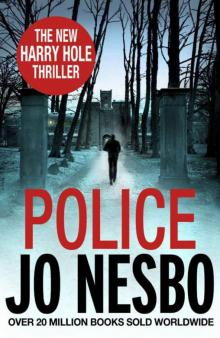 Police hh-10
Police hh-10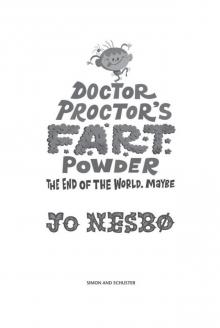 The End of the World. Maybe
The End of the World. Maybe The Thirst: Harry Hole 11
The Thirst: Harry Hole 11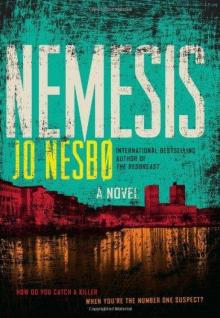 Nemesis - Harry Hole 02
Nemesis - Harry Hole 02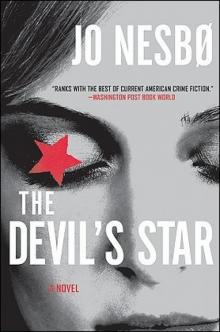 The Devil's star hh-5
The Devil's star hh-5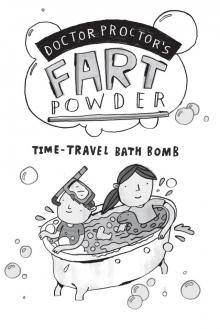 Time-Travel Bath Bomb
Time-Travel Bath Bomb